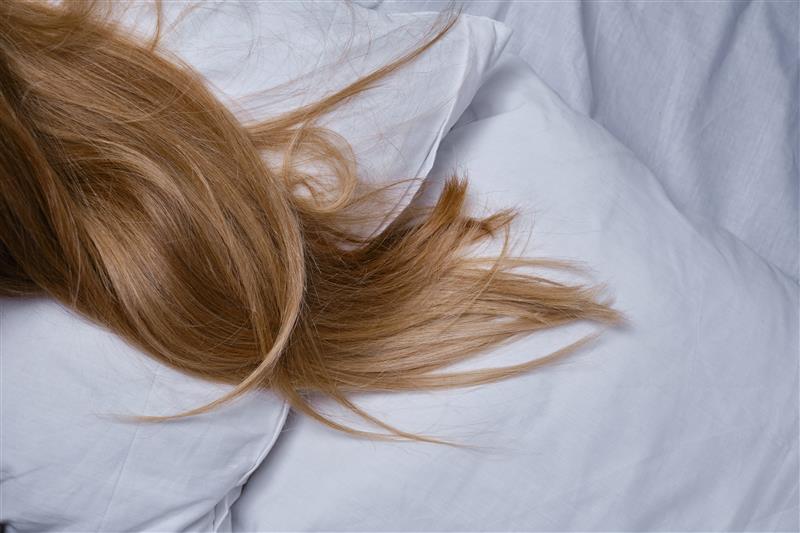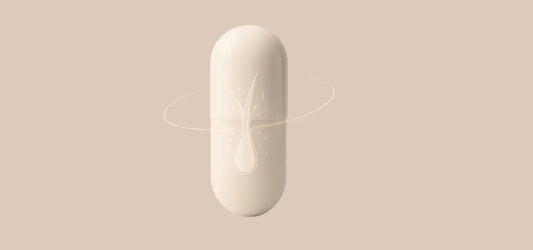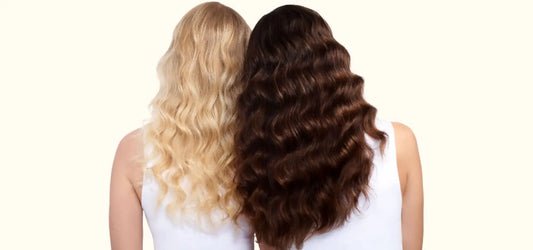The Science Behind Sleep and Hair Follicle Health

SHOP this article
OMI
Hair Growth Peptides Capsules
Promote stronger hair growth and scalp health with our unique peptide formula.
Sleep. It’s one of the most fundamental yet consistently overlooked aspects of wellness. While we may recognize the importance of sleep in terms of boosting energy, mood and mental clarity, few of us realize just how profoundly sleep affects the health of our skin, immune system, even our hair.
Emerging research highlights a strong connection between good sleep hygiene—which includes maintaining a regular sleep schedule, avoiding screens before bed and keeping your bedroom cool and dark—and hair health. Inadequate sleep not only leads to fatigue, but it can also disrupt the delicate balance of hormones and cellular processes that support hair growth. This disruption can trigger hair loss, thinning, and poor regrowth. This article explains the science behind sleep and hair growth, and why good sleep hygiene is a key supporting player in overall hair health.
Sleep Deprivation's Hidden Role in Excess Hair Shedding and Thinning
To fully understand how sleep impacts hair health, it's important to first examine the hair growth cycle. Hair grows in three distinct phases: the anagen phase, when follicles are actively producing new strands; the catagen phase, where growth slows and the follicle begins to shrink; and the telogen phase, when old hairs rest and eventually shed to allow new hairs to emerge. Sleep plays an integral role in maintaining this cycle because it’s when the body undergoes repair and regeneration, including within the hair follicles themselves.
During deep sleep, the body increases its production of growth hormone (GH) and insulin-like growth factor 1 (IGF-1), both of which are essential for cellular repair and stimulating follicle activity. Sleep deprivation, as well as poor sleep quality, can disrupt these processes, which impairs the natural rhythm of hair growth and leads to thinning and shedding.
How Sleep Quality Affects Hormones, Collagen Production and Hair Strength
Hair follicles are highly sensitive to hormonal fluctuations, and sleep plays a major role in regulating key hormones that impact hair. This interplay illustrates how delicate the balance is when it comes to hair health. Think of a sleep as a symphony conductor, synchronizing the hormonal cycles that influence hair follicle strength, scalp condition, and cell turnover. When sleep patterns are disrupted, this synchronization falters, causing cascading effects that lead to brittle strands, slowed growth, and increased shedding. This highlights that maintaining proper sleep hygiene is not only beneficial for general well-being, but essential for protecting and nourishing hair from within. The following hormones are a key part of this delicate process:
Cortisol: The Stress Hormone
Poor sleep raises cortisol levels, and high cortisol can push hair follicles prematurely into the telogen phase, leading to increased shedding. Chronic sleep deprivation maintains elevated cortisol, making it difficult for hair to recover.
Melatonin: The Sleep and Hair Hormone
Melatonin, known for regulating sleep-wake cycles, also influences hair growth by acting on hair follicle receptors and functioning as an antioxidant. Reduced melatonin due to sleep loss weakens this support system, contributing to hair thinning and slower regrowth.
DHT (Dihydrotestosterone): The Pattern Baldness Hormone
Sleep deprivation may increase the sensitivity of follicles to DHT, a hormone linked to androgenetic alopecia (pattern hair loss). When DHT binds to follicle receptors, it causes them to shrink, leading to progressive hair thinning.
The Role of Growth Hormones During Sleep
During deep sleep, the body releases growth hormone (GH) and insulin-like growth factor-1 (IGF-1). These hormones are essential for cellular repair, protein synthesis, and maintaining the anagen phase.
Growth hormone in particular peaks during the earliest stages of deep sleep and drives the regeneration of tissues, including the delicate cells of hair follicles. It supports the synthesis of keratin and collagen, key structural proteins that strengthen hair strands. GH also enhances nutrient uptake in follicular cells, enabling them to function optimally.
When sleep quality is poor, the natural surge of growth hormone is blunted, reducing its reparative effects and leaving hair more vulnerable to thinning and breakage. Sleep deprivation diminishes these hormones, impairing hair regeneration.
Inflammation, Circulation, and Nutrient Absorption: The Indirect Effects
Poor sleep hygiene doesn’t just affect hormones, it also causes systemic inflammation, which negatively impacts scalp health, increasing the risk of conditions like seborrheic dermatitis or psoriasis, which further stress hair follicles.
Lack of sleep also impairs microcirculation, the tiny blood vessels that deliver oxygen and nutrients to the scalp. Reduced circulation starves hair follicles of the essentials they need to thrive.
Finally, poor sleep can interfere with nutrient absorption, particularly iron, zinc, and protein, all vital for strong hair structure.
Scientific Evidence Linking Sleep and Hair Loss
A growing body of scientific evidence underscores the critical relationship between sleep quality and hair health. Clinical observations reveal that dermatologists frequently see patients with chronic insomnia or irregular sleep patterns reporting increased hair shedding, thinning, and slower regrowth. These conditions often improve when sleep quality is restored, highlighting a direct link between rest and hair vitality.
Hormonal studies also show that inadequate sleep disrupts growth hormone and melatonin, both of which are essential for maintaining the hair growth cycle. When these hormones decrease, hair follicles weaken and lose their regenerative powers. Stress-related research also shows that elevated cortisol levels due to insufficient sleep accelerate the shift of hair follicles from the growth (anagen) phase to the resting (telogen) phase, causing premature shedding.
Sleep deprivation has also been linked to systemic inflammation that can impact scalp health by creating microinflammation around follicles, damaging them and hindering new hair growth. Population-based studies support these findings, showing that those with poor sleep hygiene, including irregular sleep schedules or shorter sleep duration (less than six hours per night) face a higher risk of diffuse thinning and stress-induced hair loss.
Together, these findings illustrate that sleep is not just restorative for the mind and body but is also a key factor in maintaining strong, healthy hair.
Natural Sleep Optimization Strategies for Healthier Hair Growth
The American Academy of Sleep Medicine (AASM) recommends the following sleep durations:
-
Adults (18–60 years): 7 or more hours per night
-
Teens (13–18 years): 8–10 hours per night
-
Children: 9–12 hours, depending on age
Meeting these recommendations supports overall health, hormonal regulation, and optimal hair follicle function. Some tips to optimize sleep quality include:
-
Maintain a Consistent Sleep Schedule
Going to bed and waking up at the same time every day helps regulate circadian rhythms, which influences melatonin production and hair health.
-
Create a Restful Sleep Environment
Ensure your bedroom is dark, cool, and free of distractions. Using blackout curtains, white noise, or a sleep mask can enhance sleep quality.
-
Reduce Stress Before Bed
Stress management techniques like meditation, yoga, or a warm bath can lower cortisol and prepare the body for restful sleep.
-
Limit Blue Light Exposure
Avoid screens at least an hour before bed to prevent disruption of melatonin production.
-
Optimize Nutrition
Eat a balanced diet rich in protein, iron, zinc, and antioxidants to provide your follicles with essential nutrients.
When to Seek Professional Help
If you experience persistent hair loss despite improving your sleep habits, it may be due to underlying conditions such as androgenetic alopecia, thyroid imbalances, or autoimmune disorders. Consulting a trichologist, dermatologist, or hair restoration specialist can help identify the root cause.
The Takeaway: Sleep Is Vital for Healthy Hair Growth
Sleep is more than just a time to recharge, it’s a crucial period for the body’s repair mechanisms, including those that maintain healthy hair. Chronic sleep deprivation disrupts hormonal balance, reduces nutrient delivery to follicles, and increases inflammation, all of which contribute to hair loss.
Prioritizing good sleep hygiene is an easy, natural way to support your hair’s growth potential. While sleep alone may not cure every form of hair loss, it’s a powerful factor that should not be underestimated in any hair care regimen.
Frequently Asked Questions
Can lack of sleep really cause hair loss?
Will improving my sleep help my hair grow back?
How many hours of sleep do I need to keep my hair healthy?
References
- 1. Kim YG, Choi JW, Ahn J, et al. The impact of sleep quality on hair loss severity: a retrospective cohort study. Ann Dermatol. 2019;31(6):679-684. doi:10.5021/ad.2019.31.6.679
- 2. Monpure London. Hair Loss and Sleep: What’s the Connection? Monpure Blog. Published 2021. Accessed July 2025.
- 3. Trichology.com. The Impact of Sleep on Hair Health: Understanding the Connection. Published 2023. Accessed July 2025.
- 4. Dermimatch Hair Restoration. Lack of Sleep and Hair Loss: Exploring the Evidence. Published 2023. Accessed July 2025.
- 5. Treatment Rooms London. Can Lack of Sleep Cause Hair Loss? Published 2023. Accessed July 2025.
- 6. Scandinavian Biolabs. Can Lack of Sleep Cause Hair Loss? Scientific Research. Published 2023. Accessed July 2025.
- 7. Times of India. Losing sleep? Your hair will pay for it. Times of India. Published March 2024. Accessed July 2025.
- 8. L’Oréal Paris USA. How Sleep Affects Hair: The Connection Between Sleep and Hair Health. Published 2024. Accessed July 2025.
- 9. Hair Free Hair Grow. Sleep and Hair Loss: How Are They Related? Published 2024. Accessed July 2025.
- 10. American Academy of Sleep Medicine. Recommended Amount of Sleep for a Healthy Life. AASM Guidelines. Updated 2024. Accessed July 2025.









